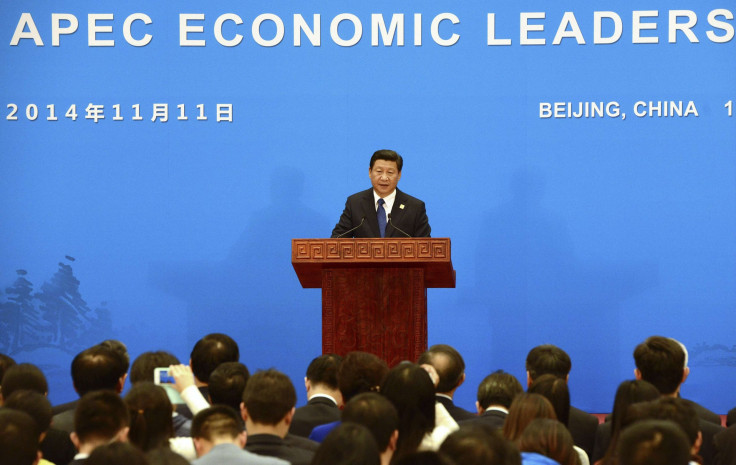China Gathers Support For Asia-Pacific Trade Pact Seen As Rival To US-Backed TPP

World leaders, including U.S. President Barack Obama and Russian President Vladimir Putin, reportedly agreed on Tuesday to move toward the establishment of the Free Trade Area of the Asia-Pacific, or FTAAP, a free trade bloc seen as a Chinese rival to the U.S.-backed Trans-Pacific Partnership, or TPP, pact.
The announcement comes even as negotiations on the U.S.-backed TPP have stumbled, primarily due to disagreements between the U.S. and Japan over the pact’s sweeping nature of proposals to open up domestic markets, according to media reports. The 21-member Asia Pacific Economic Cooperation, or APEC, bloc approved the launch of a two-year study of the initiative proposed by China -- a move Chinese President Xi Jinping reportedly called a “historic step.”
“It demonstrated the confidence and determination of the APEC in advancing regional economic integration, and it was a decision that will be written into history books,” Xi said, at a press conference on Tuesday, according to a report by China’s Xinhua News Agency.
Meanwhile, officials from the U.S., Mexico, Japan and Australia reportedly held separate talks, on the sidelines of the two-day summit, aimed at resolving disagreements over the TPP, and said that they were making progress.
“We have instructed our Ministers and negotiators to make concluding this agreement a top priority so that our businesses, workers, farmers, and consumers can start to reap the real and substantial benefits of the TPP agreement as soon as possible,” a joint statement issued after the talks, said. “Continued engagement will be critical as our Ministers work to resolve the remaining issues in the negotiation."
The TPP includes the U.S., Canada and 10 nations of the Asia Pacific region. China is not a part of the TPP, which is being perceived as a move by the U.S. to counter Chinese influence in the region. However, U.S. President Barack Obama, in an interview to Xinhua, said that the U.S. was in no way trying to restrict China's growth.
“We want China and the Chinese people to succeed and contribute to global security and prosperity, because it is good for all of us,” Obama reportedly said.
Separately, the U.S. and China on Monday reached an agreement on eliminating tariffs on a range of technology products, including semiconductors, medical devices and Global Positioning System devices, Michael Froman, the U.S. Trade Representative said.
“To give you some idea of the importance of this agreement, the last time the WTO agreed to eliminate tariffs on IT products was in 1996 when most of the GPS technology, much of the medical equipment, software, and high-tech gadgetry that we rely on in our daily lives didn’t even exist,” Froman said, in a statement released Monday. “Since that time, global trade in these types of high-tech products have reached $4 trillion annually.”
The new agreement, Froman said, will eliminate tariffs on nearly $1 trillion in trade and marks a significant breakthrough in U.S.-China trade negotiations.
© Copyright IBTimes 2024. All rights reserved.






















